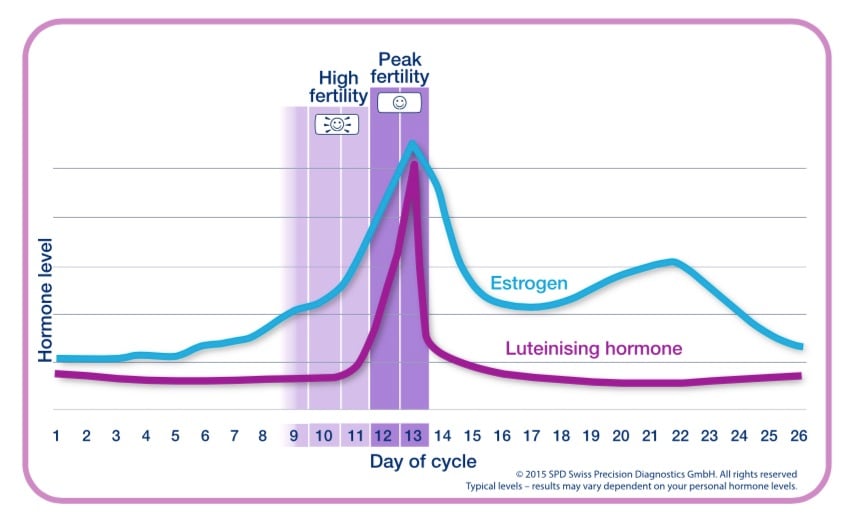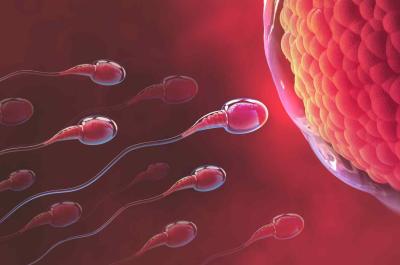
Can sperm really survive for up to five days in a woman’s body? How long does sperm live outside the body? Find out all about sperm and its lifecycle, from how it’s made to how long it can survive, how to keep sperm healthy, and more!
Sperm lifecycle
Millions of sperm cells are produced in the testicles every day. There is a system of tubes in the testicles called the seminiferous tubules, which is home to the germ cells that hormones, like the male sex hormone testosterone, transform into sperm. These cells divide and change until they resemble the “tadpole” shape—with the head and tail—we commonly associate with sperm (or spermatozoa, to use the scientific name for sperm cells).
Once the sperm cells have tails, they move into the epididymis, a tube behind the testes, where they will continue to develop and travel along the epididymis for another five weeks. Once the sperm has completed development, it moves into the vas deferens (the sperm duct).
When a man gets sexually aroused, sperm—about 200-400 million of them—mixes with a white-coloured liquid produced by the prostate gland and the seminal vesicles called seminal fluid. When sperm mixes with seminal fluid, this mixture is called semen. During sex, semen is ejaculated through the urethra.
If a man doesn’t ejaculate, the body will eventually break down the sperm cells and reabsorb them.
How long does it take for new sperm to form?
It takes a germ cell around 2.5 months to mature to become a sperm cell that is capable of fertilizing an egg. Although that sounds like a long time, most males produce millions of sperm each day. Because the male body is constantly producing sperm cells, a healthy male will always have sperm cells in his semen and won’t run out of sperm, even if he ejaculates several times a day. This means a man can get a woman pregnant any time (providing she is in the fertile window of her menstrual cycle).
As a man ages, his sperm count and quality tends to decline, and there may be more mutations in his sperm. Health and lifestyle factors can also lower sperm count or affect the quality of sperm. With a lower sperm count, sperm motility, (the percentage of moving sperm) or quality, the chance of conception may reduce.
How long does sperm live?
How long sperm lives really depends on the conditions the sperm is in. Sperm can die within minutes or even live for months. We break down the different scenarios for sperm life expectancy in the upcoming sections.
How long does sperm live outside the body?
Outside a male’s body, sperm can die within a few minutes. Sperm need moisture and warmth to survive, so once exposed to air, and semen starts to dry, sperm die quickly.
How long does sperm live inside a woman’s body?
Sperm can survive for up to five days in sperm-friendly cervical mucus.
Cervical mucus around the time of ovulation helps protect the sperm and keeps it alive, plus it makes it easier for the sperm to reach the egg, should it be present.
For pregnancy to occur, intercourse must take place during a woman’s fertile window—the days leading up to ovulation and the day of ovulation.

Since sperm can survive for up to five days, the five days leading up to ovulation and the day of ovulation is referred to as a woman’s fertile window.
Can sperm survive in water?
Sperm need moisture and warmth to survive, however, even if the temperature of the water were close to body temperature, water causes sperm to disperse and separates it from the protective fluids in semen.
As a result, it’s highly unlikely a woman could get pregnant from sperm in water. Also, any soap or chemicals (like chlorine) in the water kill sperm.
How long does sperm live when frozen?
If your country allows for sperm to be legally cryogenised, please note: Sperm can survive for decades when frozen using liquid nitrogen (so at a temperature of -196C). In fact, sperm can survive indefinitely in a sperm bank. Usually most sperm banks in the UK set the standard storage time as 10 years, and the law in the UK allows for sperm to be stored for up to 55 years under special circumstances. However, these deadlines are more due to legal reasons rather than any expiry date for frozen sperm.
How to improve sperm health
It takes two to make a baby, which is why healthy sperm is important. Getting the timing right for intercourse is one very important part of getting pregnant, but you can try to improve sperm health with the following lifestyle changes:
- Keep sperm temperature cool. Testicles need to be kept slightly cooler than body temperature for optimum conditions for the sperm. Loose underwear—like boxer shorts—can help you achieve this, as can taking regular breaks outside if you work in a warm environment.
- Stop smoking. Smoking can reduce fertility, so quitting is worthwhile to increase male fertility.
- Reduce alcohol consumption. Like with smoking, excessive alcohol also affects sperm quality.
- Avoid recreational drugs. Drugs like cannabis, anabolic steroids, and cocaine can damage sperm quality and reduce male fertility.
- Talk to your doctor about any medications you take. Some prescription medications or even over-the-counter medicines can affect male fertility. Talk to your doctor if you or your partner take any medication to determine whether it affects fertility.
- Make healthy lifestyle choices. Following a balanced, healthy diet and maintaining a healthy weight can help keep sperm in good condition.
- Try to lower stress. Severe stress can limit sperm production. Take steps to relax and reduce stress, if possible.
Since it takes around 2.5 months for new sperm to be produced, it’ll take some time for lifestyle changes to have an effect on the health of the sperm in your semen, so don’t expect your sperm health to improve overnight.
FAQs about the sperm lifecycle
How long can sperm live inside you to get pregnant?
Sperm can live up to five days inside a woman’s body. This is why even if intercourse happens five days before a woman ovulates, she has a chance to get pregnant because the sperm can remain alive all that time and fertilize the egg.
Does sperm die when it hits the air?
Yes, if sperm is ejaculated outside the body, it dies within minutes.
Does sperm really live for 5 days?
Yes under the right circumstances, the sperm friendly cervical mucus around ovulation helps keep sperm alive for 5 days.
What food helps increase sperm count?
There is no single food that can help increase sperm count but following a healthy diet can help overall sperm health.
The bottom line
Although it can take months for new sperm to be produced, the male body continuously produces sperm so there is a supply on hand and conception is possible any time within a woman’s fertile window.
If sperm health is a concern, a healthy lifestyle and keeping the testicles cool can help improve sperm count, motility and quality.

Quiz time!
Test your knowledge on ovulation, the menstrual cycle, and fertile days with this 2-minute quiz (10 questions).

Get pregnant naturally
Ovulation tests are accurate and simple to use.





